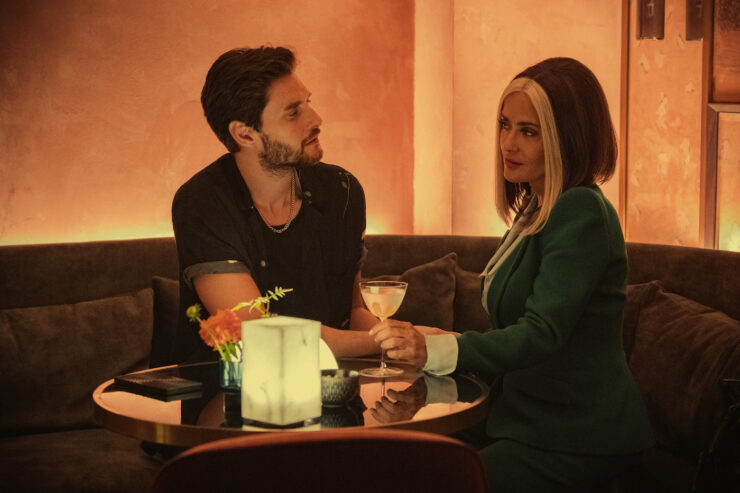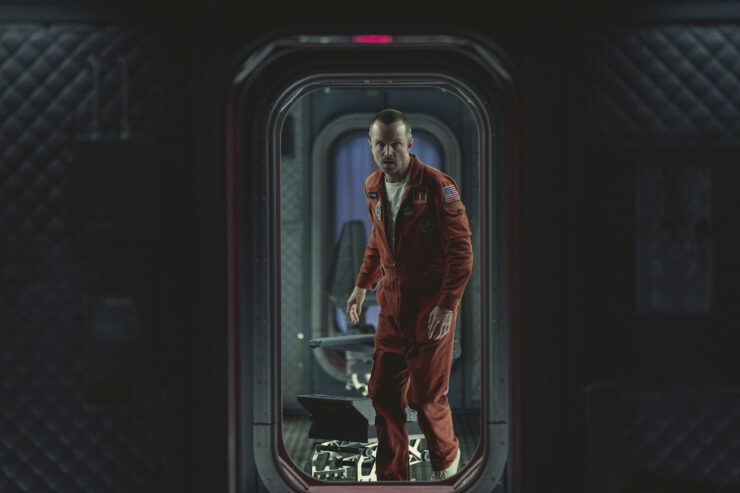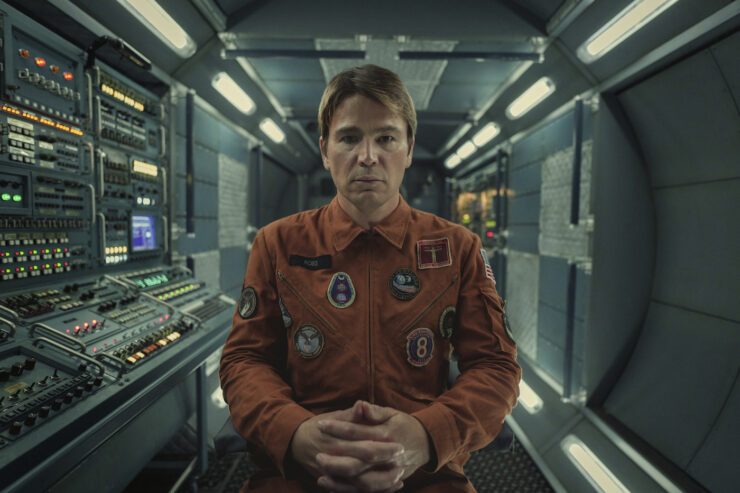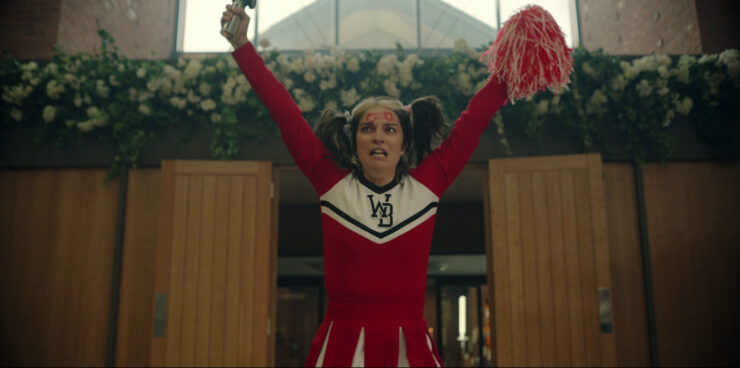After a four-year hiatus, the return of Charlie Brooker’s dystopian anthology series Black Mirror both is and isn’t exactly what you would expect. The original thesis statement (technology will ruin our lives) still rings true, but Brooker has found new and inventive ways to express it, notably by going into the past. Two of the five episodes actually veer into the supernatural, a first for these usually tech-centric tragedies. And while Black Mirror seemingly retreads old ground regarding virtual doppelgängers, this season’s two standout episodes are both the darkest and, astonishingly, the most joyous that Black Mirror has ever been.
Spoilers for Black Mirror season 6.
Kicking off the season is “Joan Is Awful,” the satirical sendup of streaming services whose star-studded cast is balanced only by its sheer number of Easter eggs. It’s an ouroboros of scathing commentary on our demand for instant-gratification streaming content, as well as our need to be the main character in our lives—but only if we’re acting so reprehensible that we (and every other viewer) feel compelled to press the “next episode” button before it’s finished loading.
Not that Joan (Annie Murphy) recognizes these psychological underpinnings at the start. She’s just the star of a waking nightmare, as she turns on Streamberry after a long day of work, only to find said long day immortalized by none other than Salma Hayek. Even though anyone would be honored to have Hayek play them in a biopic, it’s less amusing when she’s showing you how embarrassing you look singing to rap songs in the car, how disingenuously unsympathetic you are to a subordinate getting fired, and how callous you are to your well-meaning fiancé by choosing to kiss your toxic ex instead.
And then Joan wakes up, and the nightmare is just her life: Her every move is being logged by her smartphone, with Streamberry queueing up a new episode before her day has even ended. Becoming the villain means she loses her job and her fiancé, and yet she still has to create new content for the masses who can’t get enough.
Yet something this existentially mortifying requires a level of remove, which is where Brooker gets in another eerily well-timed twist of the knife: Every bit of “plot” that Joan witnesses, having acted out the source material mere hours before, is performed by artificial intelligence, little playacting pieces of code skinned to look like any celebrity who will slap their likeness on a brand partnership or trade their entire persona to Streamberry like a blank check.

When Black Mirror says AI, it usually means the “cookies,” or digital copies of anyone from a comatose elderly queer woman to a sexually harassed entry-level coder to a wrongfully accused Black man on death row—and many more. In recent seasons, the cookies are how Black Mirror grapples with concepts like the afterlife and souls, not to mention the burning question of, If I’m a perfect copy, am I still myself?
With the infinitely self-reflexive structure of Streamberry’s Joan Is Awful—Salma Hayek stars in a version where she is Joan being played by Cate Blanchett—the concept is made even grimmer to reflect the current threat to humans’ creative output: They’re not even us, they’re just code. But that AI has to learn from somewhere, or someone, which makes for the most unsettling aspect of “Joan Is Awful”: The montage in which Joan pounds an unwise number of fast-food burgers, follows that with a laxative chaser, then storms into a church in a cheerleader outfit with a dick drawn on her forehead and proceeds to take a dump in the house of God… all so that Salma Hayek will do exactly the same thing, and the real Salma will finally pay attention to what she’s signed her likeness over to.
While Joan’s gruesome take on binge-watching wreaks havoc on her very real body, “Beyond the Sea” is a brutal mirror-image examining the consequences on bodies versus consciousness in a much darker fashion.

Viewers might have expected Aaron Paul’s second Black Mirror appearance to be a continuation of his cameo at the end of “U.S.S. Callister,” in which he played foul-mouthed “Gamer 691” in the open-source virtual space universe of Infinity. Instead, “Beyond the Sea” takes place in an alternate-universe 1969, in which Paul is one of two astronauts working on a space station that must always be crewed by a pair. And instead of the cookies, or AI copies, this sci-fi drama harkens back to the season two tearjerker “Be Right Back,” which starred Domnhall Gleeson as a young man resurrected via a social media algorithm, all wrapped up in an android body eager for love and companionship.
But again, no one’s consciousness is being copied in “Beyond the Sea”; Cliff and fellow astronaut David (Josh Hartnett) instead body-hop between their flesh-and-blood selves up on the station, and their robotic doubles that reside with their families Earthside. While each is allowed to spend most of his week downplanet (their common refrain is “see you Friday”), whenever one of them or the station calls them back up, they must drop everything on Earth and plug in. They cannot be in two places at once, and the station cannot survive without both of them operating it.
The episode never explains how these two were chosen for such an honor, but like many coworkers, the only thing they have in common is their interstellar office. Planetside, Cliff has dragged his wife Lana (Kate Mara) and son out to the country for an austere existence, while David and his perfect nuclear family live in Los Angeles. A detail that I didn’t pick up on, but my husband did, was how Cliff’s religious beliefs contribute to how he inhabits his robot body; he never touches his wife, likely because he considers it adultery because it’s not actually him. I did notice that he had no compunction about corporal punishment, raising a robotic hand against his son; and how, by contrast, David’s downtime is devoted to tactile experiences like sketching, painting, and going to the movies—not to mention that he’s intensely sensual with his wife, making love to a record crooning “La Mer.”
Yet despite their polarized experiences of their home planet, neither man is able to be entirely present; even robot!David seems more interested in getting his wife off than in any reciprocity. And when a Manson-esque cult murders his family while he is forced to watch helplessly from afar, before they destroy his robot body, David’s connection to the Earth is ruthlessly tethered.
Until, that is, Cliff and Lana find it within themselves to offer up the incredible generosity of letting David pilot Cliff’s body for a little bit, just to feel some fresh air on his face for an hour a week. David quickly negotiates staying longer in a body that Cliff doesn’t even appreciate, ostensibly to use Cliff’s hands to do something that his mind never could manage: to paint the Stanfields’ house, the first time that Lana actually appreciates the beauty in where her husband has forced them to live.
David keeps pushing, until he and Lana are running errands, he’s buying her a copy of Robert A. Heinlein’s The Moon is a Harsh Mistress, and he’s even trying to seduce her to the same song—which, despite her isolation and her clear temptations to have “this” version of her husband, is not enough to make her commit actual adultery.
And when Cliff finds out and confronts David up in the station in their real bodies, rightfully calling him out but also humiliating him, David does the only thing he can: He evens the playing field by using Cliff’s body to murder Lana and their son. I had been so sure that David would kill Cliff up in space and take over his body on Earth, but I had forgotten the crucial crux of their mission: Both of them must be alive to pilot the station, or else they’ll both die up there.
It used to be that the most fucked-up ending award went to 2014’s holiday special “White Christmas,” which introduced the initial concept of cookies, culminating in a prisoner who had confessed to murdering his girlfriend stuck in an eternity of suffering the same day, scored to the darkly cheeky pun of “I Wish It Could Be Christmas Everyday.” But as much as we viewers shuddered in semi-sympathy at the notion of that fate, there was that underlying sense of the killer’s punishment fitting his crime.
Cliff is not a criminal, though he’s a shitty husband and father, and he does not deserve the fate that David decides for him. There is no final pun, only Josh Hartnett’s incredible face acting as he kicks out a chair for his compadre.

As Joan and Salma get closer and closer to the algorithmically beating heart of Joan Is Awful, their journey less and less resembles “San Junipero” or “U.S.S. Callister” and instead hews closer to the season four episode “Hang the DJ,” in which two lovelorn people discover that they are actually one of a thousand hypothetical scenarios to see if they will fall in love inside of a dating app.
Just when it seems as if “Joan Is Awful” has delivered every cringey twist, it reveals a new (literal) layer: The Joan in whom we’ve become so emotionally invested is not Source Joan. She’s actually Annie Murphy, the Schitt’s Creek star, playing the real Joan, who is indeed a nobody. This unwitting protagonist Joan is nothing more than a likeness grafted onto some code. Except, we know her. We care about her, despite ourselves. We can’t stop watching her and so we want her to succeed in destroying Streamberry’s surreal experiment.
But the only way to succeed is to give up control, is to admit that she is not the main character. When faced with the crucial turning point decision of whether to smash up the quamputer, knowing that it will erase her dimension, Joan realizes that she doesn’t even get to make that choice; it’s already been made for her, by Source Joan, and here she is acting it out for Streamberry’s audience hours later. In that exuberant, transcendental moment of giving up all control, Joan embraces her fate.

And once she destroys the tech behind Joan Is Awful, we get a sort of cracked-mirror result: We watch this Joan get split into Source Joan (Kayla Lorette), and into Annie Murphy, dressed in the same killer yellow jumpsuit as Salma Hayek (who we realize was never actually Salma Hayek). And as Joan adjusts to a life that is better suited to her, even if it’s less “exciting” than she thought she wanted, she gains a friend, or kindred spirit, in Annie.
Black Mirror season six has challenged itself, and ably succeeded, in finding new ways to explore duality of identity—and it all comes back to the music choices. Instead of a cheeky needle drop, “La Mer” tells it like it is, albeit in parallel forms. The episode is named “Beyond the Sea” for Bobby Darin’s more well-known version, but that’s not the song that plays over the ending credits. While the English translation is about two lovers, the original French song instead spans the distance between the sea itself and the narrator witnessing its vast greatness. It’s the chasm between celebrity and normie, Earth and space, life and death, love and hate, joy and despair.
Natalie Zutter is intrigued by the mirror image of “Demon 79” being what Brooker calls a “Red Mirror”—a more horror-centric (and, let’s not forget, supernatural) companion to Black Mirror. Hopefully there will be more glimpses into that mirror to come. Tell her your favorite Black Mirror season 6 episode on Twitter!










